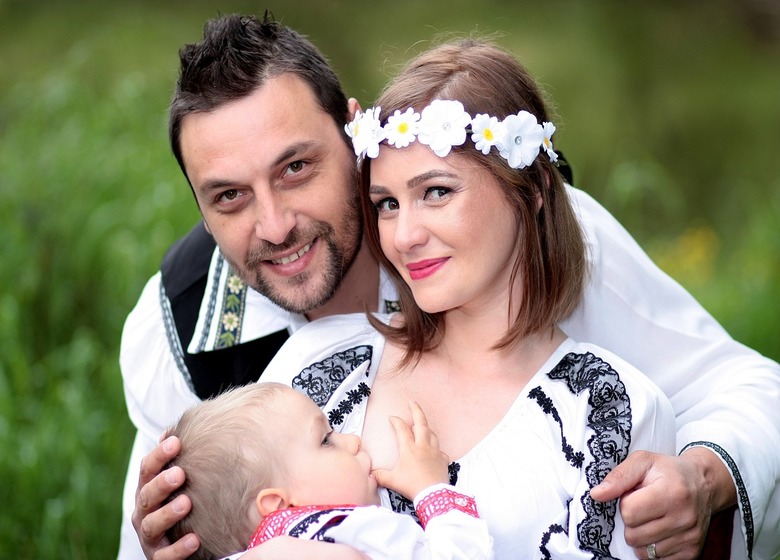It is normal for a baby to bite while breastfeeding. Most babies do it for various reasons the most common of which is teething. Babies are gnawing at something that can ease teething pain. A baby will cover the lower gum ridge or teeth (if he/she has teeth yet) with the tongue while breastfeeding properly and should be wary to bite the breast because that will damage the underside of their own tongue too. The nipple is placed deep in the baby’s mouth in the proper grip and can’t be bitten. But, if a baby is not properly latched on, or the tongue is not used properly, it can feel like he/she is clamping or biting on the nipple. Scroll down to know all about baby biting while breastfeeding.

Reasons for Baby Biting while Breastfeeding
A baby is biting while breastfeeding for a number of reasons. Besides not latching on your breast properly or being placed incorrectly during breastfeeding. Here are some factors why babies bite while breastfeeding.
- One may assume that teething is the number one cause of this problem.
- During teething, the baby finds relief from the pain by biting on the breast of the mother while breastfeeding.
- Babies quickly get distracted. If they turn to look at something, they can forget that their mother’s breast still is in their mouth. It can cause unintentional harm when the baby unintentionally closes its jaws.
- Babies often don’t get enough milk so they bite into the nipple for a better grip.
- A baby may bite involuntarily as they fall asleep while breastfeeding.
- Babies bite as a sign of love and may cause the nipple to experience unintended harm.

Preventions for Baby Biting while Breastfeeding
Many mothers are asking a common question of how to stop the baby from biting the nipple. This is something that comes to babies naturally, particularly when they’re teething. Nonetheless, by taking some steps, the mothers may try to avoid it.
- Once your child stops breastfeeding, it often bites when they get tired and bored of sucking. heck for signs of disinterest and stop nursing before biting starts.
- Mothers should learn to put their baby in the right position.
- The baby may be held wrongly when breastfeeding, and the baby can, in turn, biting on the breast of the mother.
- Make sure the baby is not distracted when feeding. The baby can forget what they are doing in case of any distractions and close their mouth which could be painful.
- Speak to your baby when feeding them to express the fact that biting is not a good thing. Engage them regularly by singing or sharing a story as they sleep.
- Just say a strong’ no’ when you see their jaws close to biting. You may have to play with different ways to say it for this too because a stern impression might work for others and something else.
- When the breasts are engorged, it can be hard for the baby to latch on. So try expressing some milk before you start breastfeeding.
Teething is one of the many issues facing all babies. The baby’s gum itches and aches during this time and as such, the baby bites while breastfeeding to ease the pain and itch. - In these situations, the mother can take a clean finger to rub the gums or give them a teething toy before and after each feed.
- Knowing the way your baby bites will help keep them from taking jabs at your nipple as well. Babies usually bite at the end of a nursing period when they’ve done having enough milk and only want to play around by gnawing at your nipple. And once the baby slows down their sucking speed, gently take your breast off their lips.
- When your baby bites, gently take them off your breast and put them down immediately. It will help your little one know that biting means stopping the breastfeeding.
- Most mothers consider it successful to deter the baby from biting by promoting appropriate actions with enough praise.
- Also, feeding the baby only when it is hungry will prevent a baby from biting. When the baby is hungry, they’ll have more interest in drinking milk and less interest in biting.
Can you continue to feed your infant, even after Teething?
There is no reason why you can’t keep your baby fed when they grow their milk teeth. It’s a common misconception that when a baby has teeth and starts to bite, the time is done for breastfeeding and it’s time to start weaning. But, that isn’t necessarily true. When your baby is properly attached and placed correctly when it is breastfed, you should not feel any discomfort even though it has a pearly white mouth. A breastfeeding baby biting with gums can be as painful as a baby trying to bite with their teeth.
Biting is what most babies particularly want to do while they’re teething. With a bit of persistence on your part, it can be halted. Not all babies respond to a situation in the same way and you may need to try out our different ways to discourage him/her before you find one that works. Everything you need to avoid your baby biting you when you are breastfeeding is the three “P’s”; patience, perseverance, and persistence.
While babies biting during breastfeeding can be painful and irritating for mothers, you can not keep it away. You may endure a lot of pain and breastfeeding issues, but the results will definitely be rewarding for you and your baby. After all, a mother’s milk is nutrient-rich with antibodies that contributes to the health and development of a baby.
Also Read: Breastfeeding In Public: Is It Ok?













